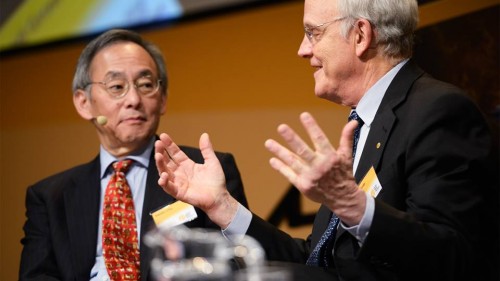Tag archives: conference
Physics in the US: no longer business as usual
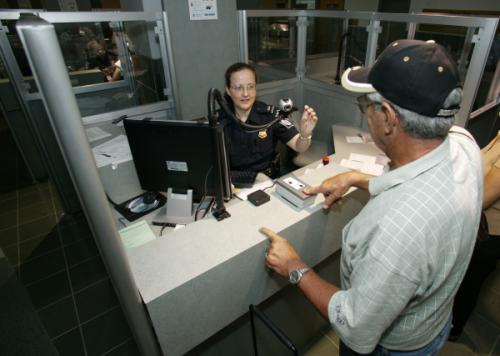
New rules: citizens of seven countries have been barred from the US. (Courtesy: CBP)
By Matin Durrani
Over the last couple of years here at Physics World, we’ve been publishing special reports examining the state of physics in different nations around the world, including Brazil, China, Japan, India, Korea and Mexico.
When we decided in September last year to publish our next special report in 2017 on the US, it seemed reasonable to expect that Hillary Clinton was going to be elected president. For science, a Clinton presidency would pretty much have been “business as usual” and so, probably, would have been the tone of our special report.
But now that Donald Trump is in the White House, it looks as if we’re entering a period where the US is as far removed from “business as usual” as you could imagine.
View all posts by this author | View this author's profile
Aspiring quantum physicists gather in Rome
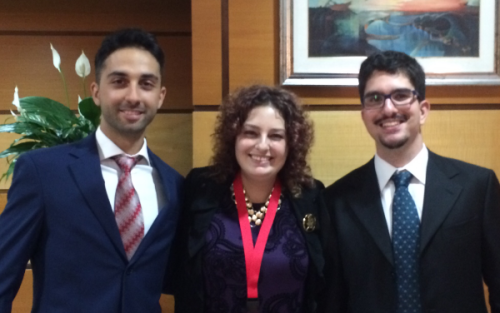
Up and coming: Fulvio Flamini (left) and Mario Ciampini (right) with Alaina Levine. (Courtesy: Alaina Levine)
By Alaina Levine
Recently I had the pleasure of travelling to La Sapienza University of Rome, to serve as the keynote speaker for the first ever Young Italian Quantum Information Science Conference. I was invited as part of a visiting lectureship programme run by the International Society of Optics and Photonics (SPIE), which supports SPIE student chapters around the world by providing travel funds for speakers.
The conference was a satellite of the annual Italian Quantum Information Science Conference (IQIS) and involved 95 students and postdocs from Italy and beyond. The day-long event was a great opportunity for the up-and-comers of quantum information to shine – and their technical talks demonstrated their expertise and passion.
View all posts by this author | View this author's profile
Conference thoughts
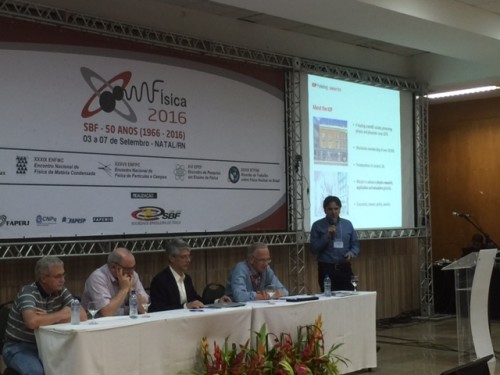
All-male line-up: Matin Durrani speaking at a round-table on the future of physics at the 50th-anniversary meeting of the Brazil Physics Society.
By Matin Durrani in Natal, Brazil
I rounded off my final full day at the 50th-anniversary meeting of the Brazil Physics Society (SBF) by taking part in a round-table on the development of physics over the next two decades organized by former SBF president Ricardo Galvão,
Alongside me (right to left in the photo above) were Christophe Rossel from IBM’s Zurich lab, who’s current president of the European Physical Society, Roger Falcone from the University of California, Berkeley who’s vice-president of the American Physical Society and will take over as head honcho in 2018, as well as Carlos Pinto de Melo from the Universidade Federal de Pernambuco, who was SBF president from 2009 to 2011. A late entry to the panel was Valentin Areviev from the Joint Institute for Nuclear Research in Dubna, Russia.
View all posts by this author | View this author's profile
Sun, sea, sand – and science
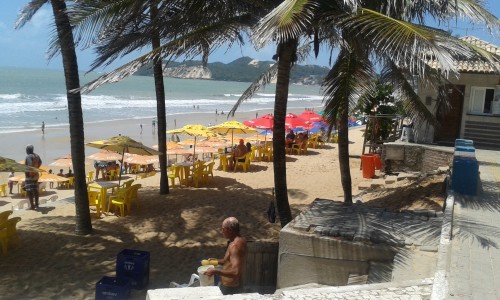
Paradise for physicists – the scene just metres from the venue for the 50th anniversary meeting of the Brazilian Physics Society in Natal.
By Matin Durrani in Natal, Brazil
From London via Lisbon, I arrived yesterday evening in Natal – a city of 800,000 people on the north-eastern tip of Brazil – for the 50th anniversary meeting of the Brazilian Physics Society (SBF).
I was invited by Ricardo Galvão, previous SBF president and chair of the organizing committee, to take part in a session later in the five-day meeting about the development of physics over the next two decades.
As editor of Physics World, which is published by the Institute of Physics (IOP), I’ll be joined by representatives from other physical societies around the world.
View all posts by this author | View this author's profile
Texas bound
By Michael Banks
Suitcase packed, I am now on the way to San Antonio for the 2015 American Physical Society (APS) meeting, which begins on Monday.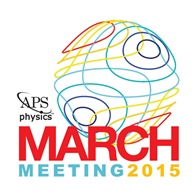
More than 9000 physicists will be heading to Texas for one of the biggest physics meetings of the year.
Having just put the finishing touches to my schedule for the five-day conference, we should be set to hear exciting results on mechanically programmable materials, the first metamaterial superconductor and the latest in flexible, stretchable electronics.
Yet there is also a more fun side to the conference with delegates also learning about modelling zombie outbreaks as well as participating in the famous APS physics sing-along.
So keep tabs on physicsworld.com for all the latest from the 2015 APS meeting.
View all posts by this author | View this author's profile
Lateral Thoughts: some things never change
By Margaret Harris
This is the second in a series of blog posts about “Lateral Thoughts”, Physics World’s long-running humour column. You can read the first one here.
The Lateral Thoughts column of humorous, off-beat or otherwise “lateral” essays has been part of Physics World ever since the magazine was launched in October 1988. In my previous post about the column’s history, I described some ways that Lateral Thoughts have changed since the early days (tl;dr version: loads of sexism, side order of class conflict). But in my trawl through the archive, I’ve also discovered that some things haven’t changed very much at all over the past quarter-century.
View all posts by this author | View this author's profile
The future of energy in Gothenburg
By Michael Banks
Yesterday I joined more than 1000 people attending the day-long Nobel Week Dialogue event in Gothenburg, Sweden. The delegates battled the cold winter weather to make it to the Swedish Exhibition and Congress Centre, just south-east of the city centre (and next to a theme park, of all things).
This is the second such Nobel Week Dialogue and the first time it has been held in Gothenburg. Last year the theme for the event in Stockholm was the “genetic revolution” and this year it was on “exploring the future of energy”.
View all posts by this author | View this author's profile
Why do beer bottles foam when struck on top?
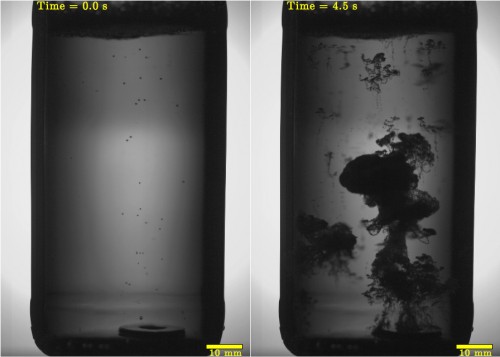
A foamy mess in the making. (Courtesy: Javier Rodríguez-Rodríguez)
By Hamish Johnston
We’ve all had a friend who does it – you’re deep in conversation at a party, beer bottle in hand, when someone sneaks up and taps the top of your bottle with theirs, causing a foamy mess to erupt from your bottle. And to add insult to injury, their bottle doesn’t foam.
Now, physicists in Spain and France have studied this curious effect and gained a better understanding of how it occurs. While their work won’t prevent wet shoes and slippery floors at university social gatherings, the researchers believe their work could provide insights into geological features such as oil reservoirs, mud volcanoes and “exploding lakes”.
Stephen Hawking boycotts high-profile Israeli conference
By James Dacey
Stephen Hawking has decided to pull out of the fifth Israeli Presidential Conference: Facing Tomorrow 2013, which is taking place in June. The world-famous British cosmologist and science communicator was due to deliver a keynote speech at the conference in Jerusalem, which boasts other presenters including Tony Blair, Bill Clinton and Mikhail Gorbachev. But it appears that Hawking has made a late U-turn. That is according to a statement published by the British Committee for Universities for Palestine – an organization of UK-based academics, set up in response to the Palestinian call for an academic boycott of Israel.
We understand that Professor Stephen Hawking has declined his invitation to attend the Israeli Presidential Conference Facing Tomorrow 2013, due to take place in Jerusalem on 18–20 June. This is his independent decision to respect the boycott, based upon his knowledge of Palestine, and on the unanimous advice of his own academic contacts there.
View all posts by this author | View this author's profile
Hunting the Higgs
By Michael Banks in Boston
“It looks like a Standard Model Higgs,” remarks Christopher Hill from Ohio State University. “Everything we have measured has strengthened that position.”
Last year, researchers working at the Large Hadron Collider (LHC) at CERN reported they had found a Higgs-like particle with an energy of around 126 GeV.
Yet while the Higgs looks like that predicted by the Standard Model of particle physics, further measurements were needed before researchers could be sure.
View all posts by this author | View this author's profile
